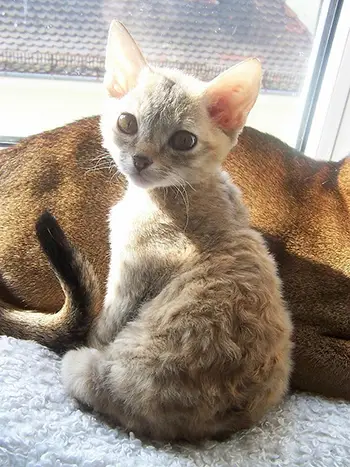Breed Standard
Head: Rounded, very broad between the ears. Well-developed cheeks. Nose with a slight break at the base. Massive, strong chin. Curly whiskers, shorter than usual.
Eyes: Medium-sized, well-spaced, and wide open. The color must be uniform and luminous, and must correspond to that of the coat.
Body: Medium-sized, solid, muscular, but not massive or heavy. Rounded, powerful chest. The back is straight from the shoulders to the croup.
Paw: Slender, moderately long. Well-developed, slightly oval paws with a rounded shape.
Tail: Moderately long, thick at the base and tapering to a rounded tip. Thick fur.
Coat: Short, velvety, soft, very silky. Must be wavy or curly. Curly over the entire body, longer than that of the Cornish Rex, more spiky. No guard hairs. Colors: all are recognized, except chocolate, lilac, and colorpoint.
Fault: Head too long, too pointed. Small ears. Short, hairless tail. Coat shaggy, not wavy enough, with hairless patches.
History
Wearing a full lambswool coat The German Rex is the oldest known breed of curly-coated cat. It first appeared in 1946 in the home of Dr. Scheuer-Karpin but was actually developed from a stray adopted by breeders in 1951. Curly-coated kittens were obtained through crosses with the Cornish Rex. This proved that the two breeds have the same gene responsible for the mutation. Both the F.I.Fe. and the S.C.F.F. recognize the German Rex. However, the C.F.A. does not distinguish it from the Cornish Rex and Devon Rex. The German Rex is very rare.
Behavior
Wearing a full lambswool coat The German Rex is the oldest known breed of curly-coated cat. It first appeared in 1946 in the home of Dr. Scheuer-Karpin but was actually developed from a stray adopted by breeders in 1951. Curly-coated kittens were obtained through crosses with the Cornish Rex. This proved that the two breeds have the same gene responsible for the mutation. Both the F.I.Fe. and the S.C.F.F. recognize the German Rex. However, the C.F.A. does not distinguish it from the Cornish Rex and Devon Rex. The German Rex is very rare.
Health
No Information Available






